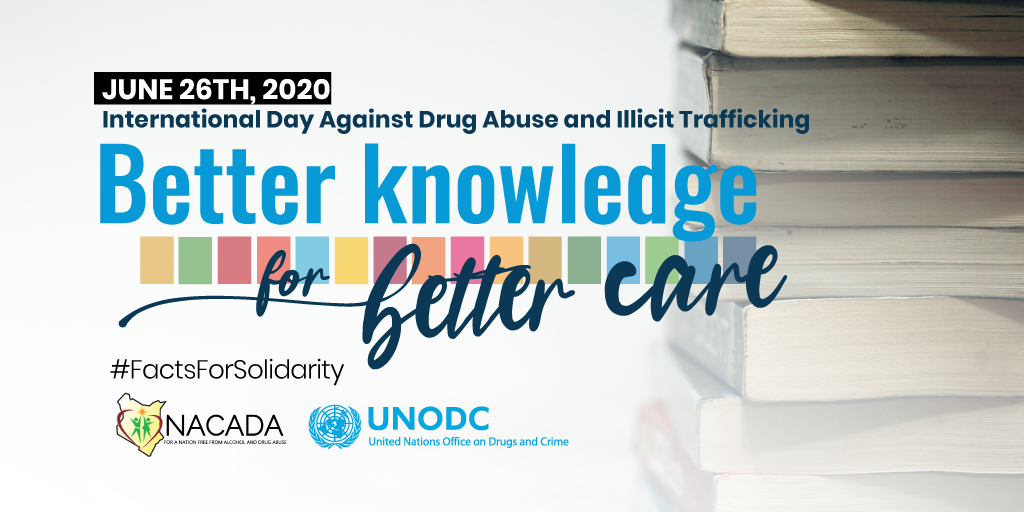NACADA Board Chairperson's speech during IDADA Commemoration on 26th June 2020
SPEECH BY PROF. MABEL IMBUGA, Ph.D., EBS
CHAIRPERSON OF THE BOARD OF DIRECTORS, NACADA;
ON THE OCCASION OF COMMEMORATION OF INTERNATIONAL DAY AGAINST DRUG ABUSE AND ILLICIT TRAFFICKING (IDADA) 2020;
HELD AT NACADA BOARDROOM, NAIROBI.
FRIDAY 26TH JUNE, 2020
Protocols
On behalf of the Board of Directors, Management and Staff of NACADA, I thank you all for joining us as we commemorate the International Day Against Drug Abuse and Illicit Trafficking, commonly – IDADA.
June 26th marks a significant date in NACADA’s calendar as it is the time to take stock of the gains made, challenges encountered, and chart a collective way forward in the fight against drug abuse and illicit trafficking. In the past, we have held national commemorative events attended by thousands of stakeholders in the fight against alcohol and drug abuse in the country. However, in adherence to the COVID-19 prevention guidelines, hosting a national event is not viable and we, therefore, welcome you to this live broadcast.
Ladies and gentlemen,
Today is the 32nd IDADA commemoration and this is a clear indication that the world continues to recognize drug abuse as a global challenge requiring global intervention.
I applaud this year’s theme ‘Better knowledge for better care’ as it takes cognizance of the need for information and knowledge in the provision of care, treatment, and rehabilitation to all those affected by drug abuse. justice and health to go hand in hand when addressing drug abuse problems. The theme underscores the fact that persons suffering from substance use disorders should be accorded quality care and addiction be regarded as any other disease requiring treatment.
Ladies and Gentlemen,
As a Country, we are facing a serious challenge of alcohol and drug abuse that threatens to reverse hard-earned socio-economic development. The country’s situation is mirrored by data obtained from various surveys conducted by NACADA and whose findings are published on our website.
According to a National Survey conducted by NACADA in 2017, alcohol is the most abused substance of abuse with 12.2% of persons aged 15 – 65 being active users of alcohol. Alcohol use also contributes to the highest-burden of Substance Use Disorders with 10.4% of the population aged between 15 and 65 years being addicted to alcohol. Amongst school-going children, the situation is grim as 20.2 percent of primary school pupils have ever used at least one substance of abuse in their lifetime as per the national survey on primary schools conducted in 2019.
These figures highlight the growing drug problem especially amongst the young generation and the threat this challenge poses on the country’s socio-economic development.
Ladies and Gentlemen,
As the Lead Agency in the fight against alcohol and drug abuse in the country, NACADA is coordinating the country’s multi-sectoral response to the challenge of alcohol and drug abuse and has designed programs to promote healthy lifestyles.
Our mandate is drawn from the National Authority for the Campaign Against Alcohol and Drug Abuse Act of 2012 and the Alcoholic Drinks Control Act of 2010. Further, we leverage on the legislation of other Government Ministries, Departments, and Agencies who are represented in the Board to effectively respond to the complexity of alcohol and drug abuse in the Country.
In reducing the demand for drugs, NACADA provides a wide range of preventive programs such as public education and advocacy targeting the community, schools and workplaces with the objective of preventing initiation into drug use and reducing the demand for drugs. On supply suppression, NACADA works with other relevant Government agencies to carry out enforcement activities to suppress the supply of drugs and substances of abuse. The agencies also carry out surveillance and regular inspections to enhance compliance to standards for businesses dealing in manufacturing, importation, distribution, and sale of alcohol and other substances of abuse.
From these interventions, we take pride in the many strides that we have achieved including putting in place a legal and policy framework that supports our operations. However, the challenge of alcohol and drug abuse is huge and a lot of work remains to be done. We will continue to open our doors for partnership and collaboration in order to counter the country’s drug problem as we know that the contribution of each and every person is critical.
Ladies and Gentlemen,
In regards to the current restrictions occasioned by the COVID-19 pandemic, we particularly concerned over the alcohol drinking behavior characterized by increased cases of drinking bouts in homes in the presence of children some of whom are carrying out online learning programs. We have also observed operations of bars where many clients are allowed to drink in closed bars in total disregard of the Government guidelines on closure of such premises. Social distancing, use of masks and sanitizers are totally disregarded in these bars. We have also noted that there is an upsurge of online sale of alcohol which exposes young persons to the risk of alcohol abuse as they easily access alcohol through online alcohol selling outlets.
To address these COVID related challenges, the Authority is working with the Ministry of Interior and Coordination of National Government and other Security and law enforcement agencies to address the COVID 19 related offenses and other alcohol and drug abuse crimes and wish to strongly warn those that are perpetuating such crimes that the law will catch up with them
Ladies and Gentlemen
As I close, allow me once again to thank all partners and stakeholders who have joined us in their various capacities to commemorate this day.
I invite you to partner with us in reaching out to all in society. We are open to working with all like-minded institutions and individuals towards the realization of a society free from alcohol and drug abuse.
Should you require any assistance or information, do not hesitate to call our toll-free line - 1192 for help.
Thank you.
PROF. MABEL IMBUGA, PhD, EBS
CHAIRPERSON, NACADA

